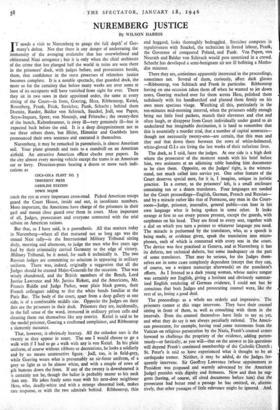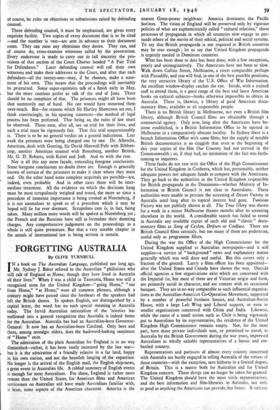NUREMBERG JUSTICE
By WILSON HARRIS IT needs a visit to Nuremberg to gauge the full depth' of Ger- many's defeat. Not that there is any danger of underrating the
immensity of the avenging avalanche that has overwhelmed and obliterated Nazi arrogance ; but it is only when the chief architects of the crime that has plunged half the world in ruins are seen there in the prisoners' dock, with judges before, and prosecutors beside, them, that confidence in the stern processes of relentless justice becomes complete. It is a notable spectacle, that guarded dock, the more so for the certainty that before many weeks are over some at least of its occupants will have vanished from sight for ever. There they sit in two rows in their appointed order, the same at every sitting of the Court—in front, Goering, Hess, Ribbentrop, Keitel, Rosenberg, Frank, Frick, Streicher, Funk, Schacht ; behind them Doenitz, Raeder, Baldur von Schirach, Sauckel, Jodi, von Papen, Seyss-Inquart, Speer, von Neurath, and Fritzsche ; the twenty-first of the bunch, Kaltenbrunner, is iway ill—very genuinely ill—but is expected back before the end. It is a deep disappointment not to see three others there, but Hitler, Himmler and Goebbels have pronounced their own sentence and executed it themselves.
Nuremberg, it may be remarked in parenthesis, is almost American soil. Your plane grounds and taxis to a standstill on an American airfield. An attractive American officer checks your papers. In the city almost every moving vehicle except the trams is an American car or lorry. Direction-posts bearing a dozen or more such indi- cations as
COCA-COLA PLANT NO. 5
TRANSIENT MESS GASOLINE STATION TOWN MAJOR
catch the eye at every important cross-road. Picked American troops guard the Court House, inside and out, in inordinate numbers. More important, the Americans have charge of the prisoners in their gaol and mount close guard over them in court. Most important of all, Judges, prosecutors and everyone connected with the trial subsist on American rations.
But that, as I have said, is a parenthesis. All that matters today in Nuremberg—where all that mattered not so long ago was the annual Nazi rally—is the International Military Tribunal sitting daily, morning and afternoon, to judge the men who five years ago had by their criminality carried Germany to the edge of victory. Military Tribunal, be it noted, for such it technically is. The two Russian judges are committing no solecism in appearing in military uniform. There was, indeed, originally a suggestion that all the Judges should be created Major-Generals for the occasion. That was wisely abandoned, and the British members of the Bench, Lord Justice Lawrence and Mr. Justice Birkett, and the Americans, Mr. Francis Biddle and Judge Parker, wear plain black gowns, their French colleagues adding to that the white bands familiar at the Paris Bar. The body of the court, apart from a deep gallery at one side, is of a comfortable middle size. Opposite the Judges on their dais are the prisoners in their dock. Prisoners they are, incidentally, in the full sense of the word, immured in ordinary prison cells and cleaning them out themselves like any convict. Keitel is said to be the model prisoner, Goering a confirmed complainer, and Ribbentrop a slatternly nuisance.
That, however, is obvimsly hearsay. All the onlooker sees is the twenty as they appear in court. The one I would choose to go a walk with if I had to go .1 walk with any is von Keitel. In his plain uniform, of course without ribbons or decorations, he looks a soldierly and by no means unattractive figure. Jodi., too, is in field-grey, while Goering wears what is presumably an air-force uniform, of a grey so light as to be almost white, and with a couple of rows of gilt buttons down the front. If any of the twenty is downhearted it is certainly not he, though the halter is probably nearer to his neck :han any. He jokes freely sotto voce with his next-door neighbour Hess, who, deadly-white and with a strange abnormal look, makes rare response, or with the two admirals behind. Ribbentrop, thin
and haggard, looks thoroughly bedraggled. Streicher competes in repulsiveness with Sauckel, the technician in forced labour, Frolic, the Governor of conquered Poland, and Funk. Von Papen, von Neurath and Baldur von Schirach would pass unnoticed in a crowd. Schacht has developed a semi-benignant air not ill befitting a Metho- dist minister.
There they are, sonietimes apparently interested in the proceedings, sometimes not. Several of them, curiously, affect dark glasses —Ribbentrop, von Schirach and Frank in particular. Ribbentrop having on one occasion taken them off when he wanted to jot down notes, Goering reached over for them across Hess, polished them sedulously with his handkerchief and planted them firmly on his own more spacious visage. Watching all this, particularly in the ten-minutes mid-morning interval, when the prisoners oddly enough bring out little food packets, munch their elevenses and chat and often laugh, or disappear from Court individually under guard to an undeclared but imaginable destination, it is hard to remember that this is essentially a murder trial, that a number of capital sentences— though not necessarily twenty-one—are certain, that this man and that and that down there between the rows of white-helmeted, white-gloved G.I.s are living the last weeks of their nefarious lives.
The dock, as I said, faces the judges. At one side is a high desk where the prosecutor of the moment stands with his brief before him, two assistants at an adjoining table handing him documents as he cites them. Opposite, on the Judges' right, is the witness- stand, not much called into service yet. One other feature of the Court deserves special note, for it is, I imagine, unique in juristic practice. In a corner, to the prisoners' left, is a small enclosure containing ten or a dozen translators. Four languages are needed for the Court proceedings—English, German, French and Russian— and by a miracle rather like that of Pentecost, any man in the Court- room—Judge, prisoner, journalist, general public—can hear in his own language what is being spoken in some other. It looks strange at first to see every person present, except the guards, with earphones on his head. They are fitted to every seat, together with a dial on which you turn a pointer to whatever language you need. The miracle is performed by the translators, who, as a speech is being made, or evidence given, speak the translation into micro- phones, each of which is connected with every seat in the court. The device was first practised at Geneva, and at Nuremberg it has its defects, not technical defects, but some inadequacy on the part of some translators. That may be serious, for the Judges them- selves are in some cases completely dependent (except that they can, of course, see a written transcript afterwards) on the translator's efforts. As I listened to a dark young woman, whose native tongue was certainly not English, giving a hesitant and obviously summar- ised English rendering of German evidence, I could not but be conscious that both Judges and prosecuting counsel were, like the rest of us, losing a good deal.
The proceedings as a whole are orderly and impressive." The prisoners cannot at this stage intervene. They have their counsel sitting in front of them, as well as consulting with them in the intervals. Even the counsel themselves have little to say as yet, and what they do say is not always peculiarly rational. The Ameri- can prosecutor, for example, having read some statements from. the Vatican on religious persecution by the Nazis, Frank's counsel comes forward to challenge the propriety of the evidence, adding porten- tously—or farcically, as you will—that on the answer to his questions will depend Frank's continued membership of the Catholic Church ; St. Peter's is said to have experienced what it thought to be an earthquake tremor. Neither, it may be added, do the Judges fre- quently intervene. Sir Geoffrey Lawrence (whose appointment as President was proposed and warmly advocated by the American Judge) presides with dignity and firmness. Now and then he sug- gests (having, of course, all cited documents before him) that the prosecutor had better read a passage he has omitted, or, alterna- tively, that other passages of little relevance might.be ignored. And,
of course, he rules on objections or submissions raised by defending counsel.
These defending counsel, it must be emphasised, are given every requisite facility. Two copies of every document that is to be cited —and the number is vast—are sent in advance to their document room. They can raise any objections they desire. They can, and of course do, cross-examine witnesses called by the prosecution. Every endeavour is made to carry out in full sincerity the pro- visions of that section of the Court Charter headed "A Fair Trial for Defendants." Later defending counsel will call their own witnesses and make their addresses to the Court, and after that each defendant—all the twenty-one—may, if he chooses, make a state- ment of his own. This means that the proceedings will inevitably be protracted. Some super-optimists talk of a finish early in May, but the more cautious prefer to talk of the end of June. There should be no complaint of that. The prisoners might all have been shot summarily out of hand. No one would have mourned them over-much. But—for reasons which Sir Hartley Shawcross set out, I think convincingly, in his opening statement—the method of legal process has been preferred. That being so, the rules of law must be observed. These men, after all, are on trial for their lives, and such a trial must be rigorously fair. That this trial unquestionably is. There is to be no general verdict on a general indictment. Last week the prisoners were being charged one by one. Dr. Albrecht, American, dealt with Goering, Sir David Maxwell Fyfe with Ribben- trop, another American counsel with Rosenberg, another British, Mr. G. D. Roberts, with Keitel and Jodi. And so with the rest.
Nor is all this any mere facade, concealing foregone conclusions. Some foregone conclusions no doubt there are. Enough is generally known of certain of the prisoners to make it clear where they must end. On the other hand some complete acquittals are possible—are, indeed, even probable. And in other cases there will be inter- mediate treatment. All the evidence on which the decisions hang must be most scrupulously weighed and tested, the more so since a precedent of immense importance is being created at Nuremberg, if it is not anomalous to speak so of a precedent which it may be hoped will lie for ever dormant. Scrupulous care is, in fact, being taken. Many million more words will be spoken at Nuremberg yet ; the French and the Russians have still to formulate their damning charges. Any comprehensive judgement on the proceedings as a whole is still quite premature. But that a very notable chapter in the annals of international law is being written is certain.



























 Previous page
Previous page